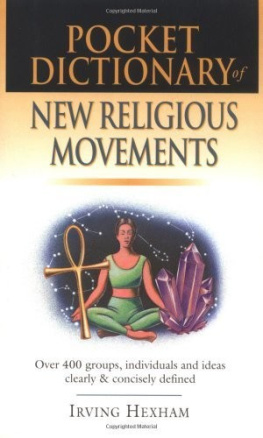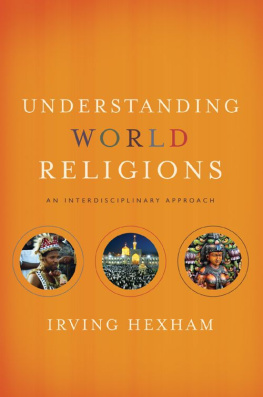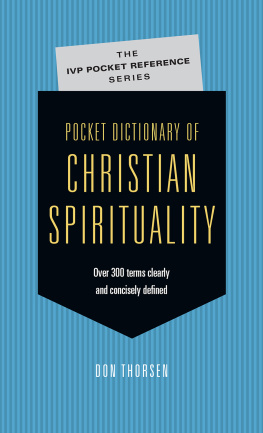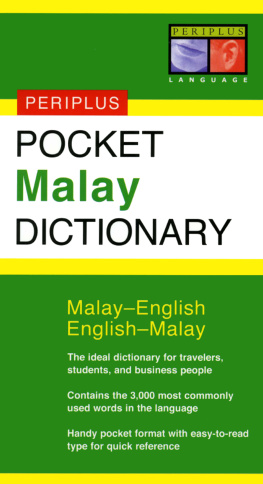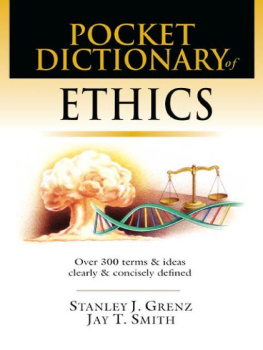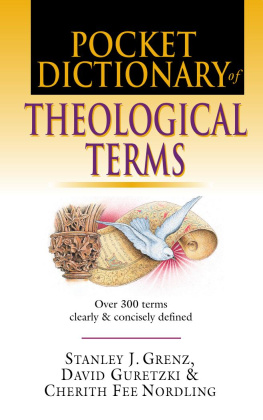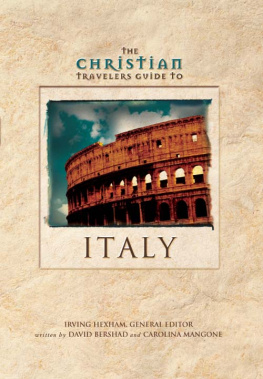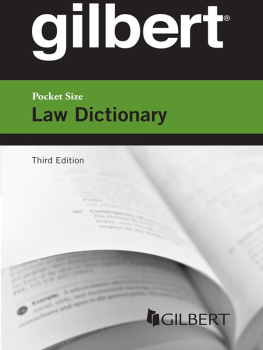Irving Hexham - Pocket Dictionary of New Religious Movements
Here you can read online Irving Hexham - Pocket Dictionary of New Religious Movements full text of the book (entire story) in english for free. Download pdf and epub, get meaning, cover and reviews about this ebook. year: 2002, publisher: Intervarsity Pr, genre: Religion. Description of the work, (preface) as well as reviews are available. Best literature library LitArk.com created for fans of good reading and offers a wide selection of genres:
Romance novel
Science fiction
Adventure
Detective
Science
History
Home and family
Prose
Art
Politics
Computer
Non-fiction
Religion
Business
Children
Humor
Choose a favorite category and find really read worthwhile books. Enjoy immersion in the world of imagination, feel the emotions of the characters or learn something new for yourself, make an fascinating discovery.
- Book:Pocket Dictionary of New Religious Movements
- Author:
- Publisher:Intervarsity Pr
- Genre:
- Year:2002
- Rating:4 / 5
- Favourites:Add to favourites
- Your mark:
- 80
- 1
- 2
- 3
- 4
- 5
Pocket Dictionary of New Religious Movements: summary, description and annotation
We offer to read an annotation, description, summary or preface (depends on what the author of the book "Pocket Dictionary of New Religious Movements" wrote himself). If you haven't found the necessary information about the book — write in the comments, we will try to find it.
Pocket Dictionary of New Religious Movements — read online for free the complete book (whole text) full work
Below is the text of the book, divided by pages. System saving the place of the last page read, allows you to conveniently read the book "Pocket Dictionary of New Religious Movements" online for free, without having to search again every time where you left off. Put a bookmark, and you can go to the page where you finished reading at any time.
Font size:
Interval:
Bookmark:


IRVING HEXHAM

Finding your way around a new subject can be a daunting task. This dictionary was compiled to help you navigate your religious studies course or identify the various religious groups and ideas you encounter in everyday life. It is based on twenty years of experience in teaching courses on new religions to undergraduates and on extensive archival and field work in Africa, Europe and North America.
My aim throughout has been to produce a book that would be of practical value to the struggling student. So at the outset let me lay out some points you'll want to be aware of.
First, all the terms deal with what sociologists and scholars of religion usually call new religious movements, or NRMs. These are religious groups that the press and members of the public usually call "cults."
Second, information on some items can prove difficult to obtain. Therefore I have addressed each item not according to an evaluation of its overall importance in religious studies but in terms of the difficulty students are likely to encounter in gaining information about it.
Third, I have retained the essentially Christian system of dates-B.C. and A.D.-instead of the increasingly popular B.C.E. ("Before Common Era") and C.E. ("Common Era"). This is because the so-called Common Era is common to Jews and Christians but still excludes Buddhists, Hindus and Muslims. It is therefore a misleading term. For this reason I prefer the traditional Western usage to a modern innovation that does not even have the saving grace that it developed in a homogeneous society.
Fourth, while many of the movements mentioned in this text maintain websites, I have chosen not to include addresses for those sites. As anyone who uses the Internet knows, URLs are constantly changing. So let me just direct you to my own website-"Cults and Religions" . There you can find updated links to the websites of groups mentioned in this dictionary as well as additional essays and bibliographical information on the subject of new religious movements.
I wish to acknowledge my debt to my original teacher, Ninian Smart, whose professionalism and enthusiasm for religious stud ics kindled my own interest. From him I learned the value of empathy and philosophical analysis. Later, from Fred Welbourn, I realized the importance of getting one's hands dirty by studying living religions and not only texts abstracted from their social setting.
I must confess the use of many sources, the most important of which are the following: Geddes MacGregor, Dictionary of Religion and Philosophy; Peter A. Angeles, Dictionary o Philosophy; S. C. F. Brandon, A Dictionary of Comparative Religion; Erwin L. Locker, Lutheran Cyclopedia; J. D. Douglas, New Bible Dictionary; Daniel G. Reid, Dictionary of Christianity in America; Paul Edward, The Encyclopedia of Philosophy; F. L. Cross, The Oxford Dictionary of the Christian Church; Lefferts A. Loetscher, Twentieth-Century Encyclopedia of Religious Knowledge; Phillip P. Wiener, Dictionary of the History of Ideas; Sinclair B. Ferguson and David F. Wright, New Dictionary of Theology; Walter A. Elwell, Evangelical Dictionary of Theology; Benjamin Walker, Hindu World; H. A. R. Gibb and J. H. Kramers, Shorter Encyclopedia of Islam; Gordon Melton's various reference works on new religions; Karl Rahner, Encyclopedia of Theology: The Concise "Sacramentum Mundi"; and handouts provided by my various teachers, especially Colin Lyas, Edward Conze, Bob Morgan, David Catchpole and Jacob Zakkie (James Dickie).
Finally, I hope this text will be judged in terms of its contribution to student needs and its value as a research tool.
Aagaard, Johannes (1928-). Professor of religious studies at the University of Aarhus in Denmark who pioneered the study of *new religions in Europe. His work ranges from objective scholarship to writing and editing to *countercult and even *anticult apologetics. He is the coeditor of Berliner Dialog and coeditor, with Helle Meldgaard, of Religious Movements in Europe (1997).
Abramic religions. Religious traditions that trace their ancestry to the patriarch Abraham. The major religions in this grouping are Christianity, Islam and Judaism. Generally Abramic religions stress (1) the importance of a Creator God who is separate from the world and (2) the duty of humans to obey God.
absolute. A concept popularized by the German philosopher Georg Wilhelm Friedrich Hegel (1770-1831) and used by many philosophers in the nineteenth century to signify self-subsistence, unconditionedness, the ultimate, the first cause or God. It was revived in the twentieth century as a term for deity by various thinkers promoting Eastern, or *yogic, religious ideas. The notion is used in the philosophy of absolute idealism and the philosophical tradition, usually associated with Hegel, that stresses all reality as an idea of God or the Absolute.
absurd. A term used in the philosophy known as *existentialism to speak of the human condition. Many *new religions are based on existential ideas.
active imagination. A Jungian psychotherapeutic technique of introversion that is said to allow individuals direct access to the *unconscious world of memories and dreams. Using an analogy with archaeology, Carl *Jung argued that the imagination may be used "to make excavations into the phylogeny of the soul." The idea comes from theosophists, who believed that the ancestral past could be contacted directly through the imagination.
acupuncture. An ancient Chinese medical technique that involves placing needles into specific areas of the body. Some doctors believe that the procedure stimulates natural processes and releases body chemicals that speed recovery. In Eastern religions and in holistic medicine, however, its effects are often given an *occult explanation. See also alternative medicine.
Adamski, George (1891-1965). American *occultist and promoter of *pseudoscience who popularized the idea of UFOs, or flying saucers, through his claim to have been contacted by "space brothers." The au thor of one science fiction novel, Pioneers in Space, he became famous through his book Flying Saucers Have Landed (1953), which he wrote with Desmond Leslie. This book draws on *theosophical sources and propagates the basic ancient astronautics theory found in later writers such as Erich von *Daniken and Shirley *Maclaine. Adamski's work is important in understanding the *New Age movement.
adventism. The belief that Christ's return is imminent and will inaugurate a millennial kingdom. (See chiliasm; millenarian movement; millennialism.) Throughout Christian history various adventist groups have arisen. In the nineteenth century, however, they flourished in America as the result of the teachings of a Baptist minister, William *Miller. Out of his prophetic conferences various adventist movements developed, the most famous being the *Seventh-day Adventists. The ideas generated by this dynamic movement influenced many orthodox Christian groups as well as gave birth to a large number of unorthodox groups, such as the *Jehovah's Witnesses and *Christadelphians.
Font size:
Interval:
Bookmark:
Similar books «Pocket Dictionary of New Religious Movements»
Look at similar books to Pocket Dictionary of New Religious Movements. We have selected literature similar in name and meaning in the hope of providing readers with more options to find new, interesting, not yet read works.
Discussion, reviews of the book Pocket Dictionary of New Religious Movements and just readers' own opinions. Leave your comments, write what you think about the work, its meaning or the main characters. Specify what exactly you liked and what you didn't like, and why you think so.

